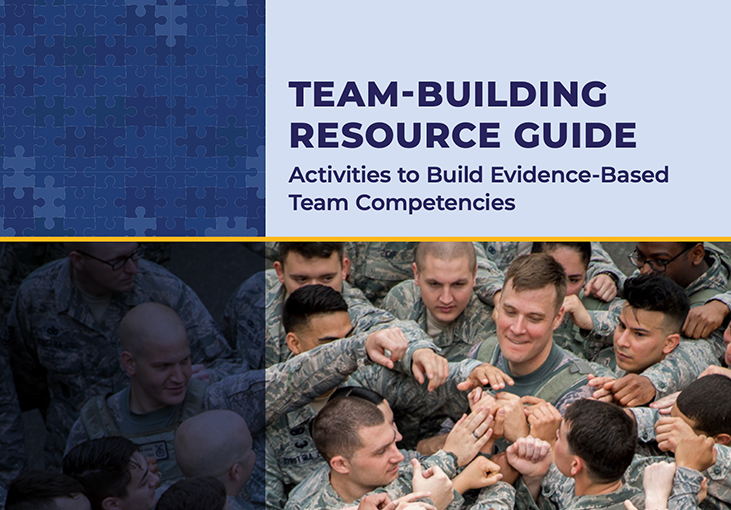High-performing military teams play an important role in mission success. While some team dynamics develop organically, intentionally building team competencies, such as trust and cohesion, can increase team performance and promote strong bonds between teammates.
Use HPRC’s Team-Building Resource Guide to boost your team’s dynamics, health, and performance. For additional team-building resources, visit HPRC’s Teams & Leadership. If you have questions about how to use this guide or about the content, please use our Ask the Expert feature to reach out to us.
Published on: March 4, 2024
References
Bandura. (2000). Exercise of human agency through collective efficacy: Current directions in psychological science. Journal of the American Psychological Society, 9(3), 75–78. doi: 10.1111/1467-8721.00064
Bishop, J. W., & Scott, K. D. (2000). An examination of organizational and team commitment in a self-directed team environment. Journal of Applied Psychology, 85(3), 439–450. doi.org/10.1037/0021-9010.85.3.439
Castaldo, S., Premazzi, K., & Zerbini, F. (2010). The meaning(s) of trust. A content analysis on the diverse conceptualizations of trust in scholarly research on business relationships. Journal of Business Ethics, 96(4), 657–668. doi: 10.1007/s10551-010-0491-4
Arizona State University (2016). COM 230 activity descriptions. Tempe, AZ.
Cornerstone Dynamics. (2024). Marshmallow challenge: Facilitator instructions. Retrieved 5 January 2024 from https://www.cornerstonedynamics.com/wp-content/uploads/Marshmallow-instructions-PDF.pdf
Duhigg, C. (2016). What Google learned from its quest to build the perfect team. The New York Times. Retrieved 5 January 2024 from https://www.nytimes.com/2016/02/28/magazine/what-google-learned-from-its-quest-to-build-the-perfect-team.html
Edmondson, A. (2016). Psychological safety and learning behavior in work teams. Administrative Science Quarterly, 44(2), 350–383. doi: 10.2307/2666999
Kirke, C. (2010). Military cohesion, culture and social psychology. Defense & Security Analysis, 26(2), 143–159. doi: 10.1080/14751798.2010.488856
Lacerenza, C. N., Marlow, S. L., Tannenbaum, S. I., & Salas, E. (2018). Team development interventions: Evidence-based approaches for improving teamwork. American Psychologist, 73(4), 517–531. doi: 10.1037/amp0000295
Leonard, A. (2016). University Innovation Fellow (UIF) Meetup. Palo Alto, CA.
Manning, F. J. (1994). Morale and cohesion in military psychiatry Military psychiatry: Preparing in peace for war, U.S. Office of the Surgeon General, Department of the Army. 1–18.doi: 10.1037/e629552011-002
Mayer, R. C., Davis, J. H., & Schoorman, F. D. (1995). An integrative model of organizational trust. The Academy of Management Review, 20(3), 709–734. doi.org/10.2307/258792
National Institute of Health. (2024). What are competencies? Retrieved 4 December 2023 from https://hr.nih.gov/about/faq/working-nih/competencies/what-are-competencies#:~:text=Competencies%20are%20the%20knowledge%2C%20skills,through%20experience%2C%20study%20or%20investigation
Personal correspondence with D. Ancona, Professor of organization studies at Massachusetts Institute of Technology (MIT), November 22, 2022.
Salas, E., DiazGranados, D., Klein, C., Burke, C. S., Stagl, K. C., Goodwin, G. F., & Halpin, S. M. (2008). Does team training improve team performance? A meta-analysis. Human Factors: The Journal of the Human Factors and Ergonomics Society, 50(6), 903–933. doi: 10.1518/001872008x375009
Shamir, B., Brainin, E., Zakay, E., & Popper, M. (2009). Perceived combat readiness as collective efficacy: Individual- and group-level analysis. Military Psychology, 12(2), 105–119. doi: 10.1207/s15327876mp1202_2
Wermser, F., Täuber, S., Essens, P., & Molleman, E. (2016). Psychological safety during military integrations. In NL ARMS Netherlands Annual Review of Military Studies 2016 (pp. 147–162): Springer.
Wessling, K. (2015). Positive psychology workout guide for designers. Retrieved 5 January 2024 from https://www.studocu.com/en-us/document/university-of-pennsylvania/developmental-psychology/positive-design-workbook/8470054
